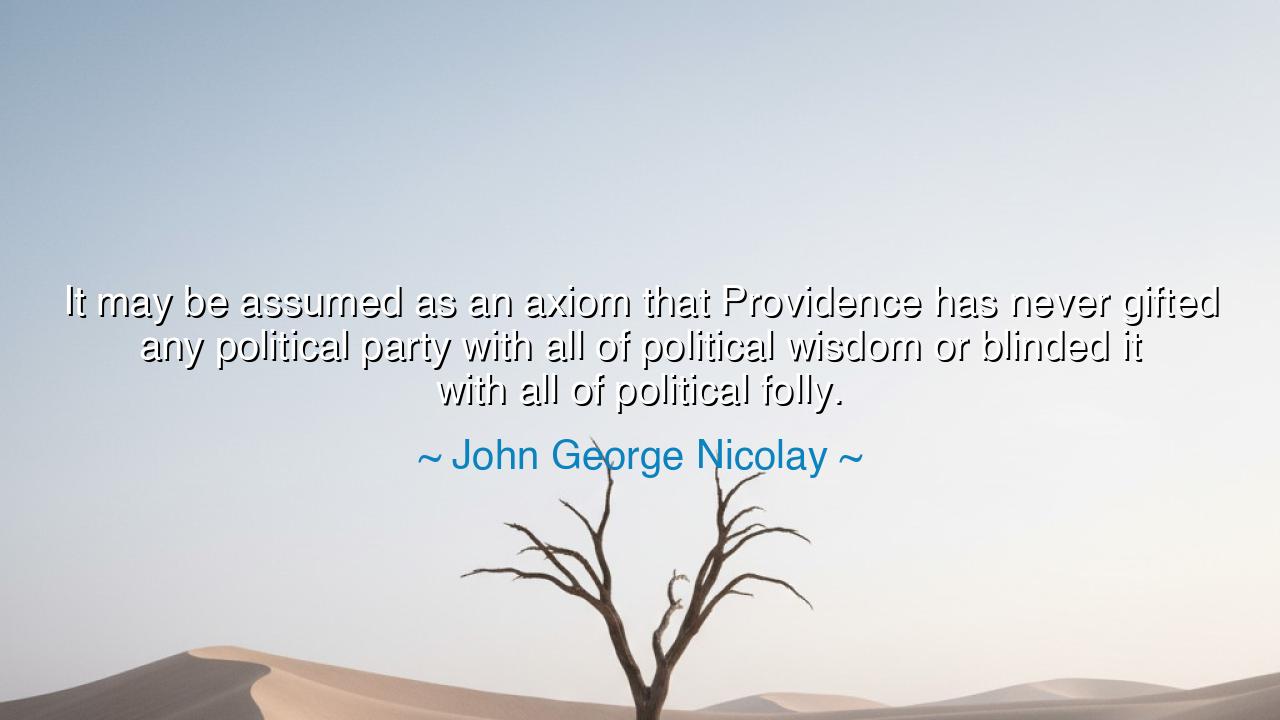
It may be assumed as an axiom that Providence has never gifted
It may be assumed as an axiom that Providence has never gifted any political party with all of political wisdom or blinded it with all of political folly.






Hearken, children of the ages, to the prudent words of John George Nicolay, who proclaimed: “It may be assumed as an axiom that Providence has never gifted any political party with all of political wisdom or blinded it with all of political folly.” In these words lies the eternal truth of humility, balance, and the nature of governance. No assembly of men, however mighty, possesses complete insight nor is utterly consumed by error. Human institutions are guided by partial understanding, shaped by virtue and error alike, and it is through this mixture that societies endure and evolve.
Nicolay teaches that political power is neither infallible nor wholly corrupt. Every faction, however confident, carries within it both sparks of insight and seeds of misjudgment. To assume that a party embodies all wisdom or all folly is to invite hubris or despair. Providence, the guiding force of the universe, ordains that mortal endeavors are tempered by the necessity of discernment, debate, and correction. Balance, not perfection, is the design of governance.
Consider the life of Abraham Lincoln, whom Nicolay himself chronicled. Lincoln navigated the United States through the crucible of civil war, guided neither by a single party’s unerring wisdom nor by infallible knowledge. The Republican Party contained voices both wise and misguided, yet through dialogue, reflection, and courage, Lincoln discerned the path toward unity and justice. Here is the living truth of Nicolay’s axiom: political wisdom is distributed, and folly is tempered by vigilance and principle.
The ancients themselves recognized this duality in governance. Aristotle and Cicero taught that no state, no assembly, could possess complete insight, for the affairs of men are fraught with uncertainty and passion. Laws and policies are crafted not in perfection, but in compromise, reflection, and the constant interplay of virtue and error. Nicolay’s reflection echoes this timeless teaching: prudence lies in acknowledging the limits of collective judgment, and in tempering action with foresight and humility.
Thus, his counsel is both warning and solace: place trust neither in the infallibility of a faction nor in its inevitable folly. Vigilance, discernment, and moral courage are required to navigate the currents of political life. By acknowledging the mixture of wisdom and error in every party, citizens and leaders alike may act with clarity, justice, and temperance.
Carry this teaching, children of generations yet unborn: approach governance with humility and insight, understanding that no assembly holds all wisdom and no faction is devoid of folly. In this balance lies the path to justice, enduring institutions, and the careful stewardship of society, guided not by certainty, but by prudence, reflection, and the vigilant pursuit of the common good.






DGdgadfg gdfgad
This quote feels timeless, almost like a warning against political fanaticism. It reminds me that every party, no matter how noble its intentions, can err. But it also raises a practical question—how do we, as voters, discern wisdom from folly when both coexist in every political movement? Should we seek moderation and compromise, or is that just an excuse for indecision? I’m torn between admiring its balance and fearing its moral ambiguity.
HTHa Thanh
As a reader, I find this observation both humbling and realistic. It implies that fallibility is universal, even among the most powerful political groups. But does this mean that citizens should distribute their trust equally among all parties, or should we still make distinctions based on performance and integrity? I’m curious how this principle applies when one party seems demonstrably more ethical or competent than another. Should fairness override perceived moral superiority?
NMPhan Ngoc Minh
This quote makes me think about the dangers of political arrogance. If no party possesses all wisdom, then shouldn’t humility and dialogue be the foundation of any political system? Yet, why do political leaders often act as though their side has an exclusive claim to truth? I’d love to hear your take on whether such an idea can genuinely survive in modern democracies dominated by tribal loyalty and echo chambers.
3NTuyen lop 8/4 37- Nguyen
I find this statement intriguing because it suggests that wisdom and folly are distributed evenly across political lines. Do you think this means that political balance is essential for good governance? Or is it implying that we, as citizens, should distrust any claim of moral or intellectual superiority by a single party? I wonder how this perspective fits into today’s hyper-partisan climate where many seem convinced that only one side holds all the answers.